It’s an angry time right now. Rights being taken away, minorities under threat, and every day it seems we wake up to some new horror that threatens what joy we’ve been able to carve out. And the worst part is that the evil that creates these horrors is often intangible, systemic, and so vast that it feels like challenging them is impossible. But you’re not alone as you think.
In SoulMuppet Publishing’s Mad As Hell, the battle against the forces of capital moves out of the halls of government and into the streets. Here the demons of capital are embodied and tangible and that means you can actually kill them. To find out how, I had a chat with SoulMuppet Director and Mad As Hell co-creator Zach Cox about community, political art, and making a game that is, well, mad as hell.
Mad As Hell created by Evie Moriarty and Zachary Cox.
Written and developed by Evie Moriarty.
Cover designed by Alex Eckman-Lawn.
Internal illustrations by Per Norden and Scrap Princess.
Editing by Will Jobst.
Layout by Dai Shugars.
Sensitivity Reading from Basil Wright and Misha Panarin.
Published by SoulMuppet Publishing
DA: While it may be obvious to some of our readers the connection between demons and capitalism, can you give me a little background on how you came to connect the two and then implement into the game?
Zach Cox: This is a game about marginalized communities, the people that live in them, and how to protect them from the forces of capital.
The forces of capital are given a face here, and that face is the Demon. Demons are products of specific, localized harms against marginalized communities, and manifest to exacerbate these existing harms.
The demon in the quickstart is a good example. It’s the Pipe Leech, a demon of dirty, lead poisoned water in rental housing. It manifests in peoples homes and drowns them in leadened water. It is a result of the negligence or neglect of a landlord, prioritizing rent over the safety of their tenants and effort. It’s part of the Choir of Leeches, all present in rental housing. There’s a million demons in the Choir of Leeches: demons of carbon monoxide poisoning, or asbestos, or evictions, or lack of insulation, or housing associations, or gentrification and property development, or whatever other soft violences landowners can inflict.
An interesting thing about the demons here is that there’s no one way to kill them, and the things we think of as traditional demon hunting weapons don’t always work. How did you come up with this new system?
Zach Cox: You don’t just fight a demon by punching it, that’ll only get you so far. There’s this really interesting investigation aspect of the game where you have to work out what violence the demon is created by, and then what kind of thing you can do to the demon to kill it.
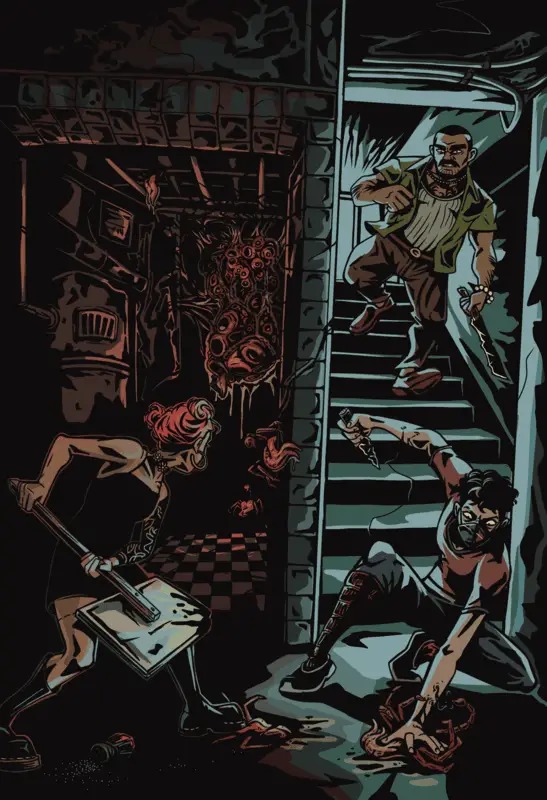
Items or behaviors which counter the violence the demon is created by will also kill the demon. You deal with a Pipe Leech by hitting it with lead-safe pipes, feeding it lead-neutralizing pills or putting it through a water filter. You deal with a Heat-Leach of insulation by blasting it with a space heater, throwing radiators at it, spraying it with foam insulation or warding it away with paid gas and electricity bills.
It’s this kind of weird and entertaining dance of Theory, where you render the horrifying into a specific problem, then abstract it into tools or weapons you can use to fight and kill it.
Tell me a bit about how you envision Mad As Hell working as an educational tool for activism?
Zach Cox: The next bit of the game is where activism comes in. If you kill the demon but don’t solve the problem, it is just going to crawl out of the wound in the world in a few days or weeks. To defeat the demon, you have to prevent the vulnerability and violence it feeds on, and that requires social change.
If Act 1 is finding out what the demon is and Act 2 is working out how to kill it, Act 3 is community organization and direct action. For the Pipe Leech, that’s finding new housing for the affected, fixing the pipes yourself or making the landlord do something about it. This could involve protests, stoking anger on Facebook groups, mobilizing community action or something much more militant.
Mad as Hell is thus meant to create a safe, lightly fictionalised environment for aspiring and current activists to become familiar with the methods used in community organisation and direct action. The structure mimics how you would approach solving these problems in a real community, and helps you learn how to tackle injustice through a radical lens.
Rome wasn’t built in a day. Then next week, a new demon shows up from a new violence. It’s monster of the week for injustice. We’ve got lots of exciting material for longer campaigns: dealing with whole Choirs, then there’s big and dangerous Dukes, Warlock mortals who have made their own pacts, and much much more.
How do you convert abstract political concepts like “solidarity” or “community” into hard game design elements?
Zach Cox: We start off with the stats. In a lot of games, stats are based around adverbs or adjectives to actions, whereas in Mad as Hell we’ve chosen activities. Your three stats are Solidarity, Conspiracy and Militancy. Most activity in Mad as Hell is split into one of these buckets, and it’s also the pipeline most people take when they become radicalised.
We also have really strong sets of mechanics for Communities. They are shared between players, and explicitly how you all know each other. This clears up some of the “We met in a tavern” problem in some other RPGs, and adds a load of texture to the player party and the city you’re playing in.
They are a group of people you know, which you can use to gather information, resources and conflict that become something permanently a part of that Community. As your Communities develop more resources and benefits, they also lose “Cohesion” from interacting with demons, danger and other quiet violences, and you have to earn it back by defeating demons and closing Wounds. Character progression in Mad as Hell mostly occurs by your Communities become more powerful!
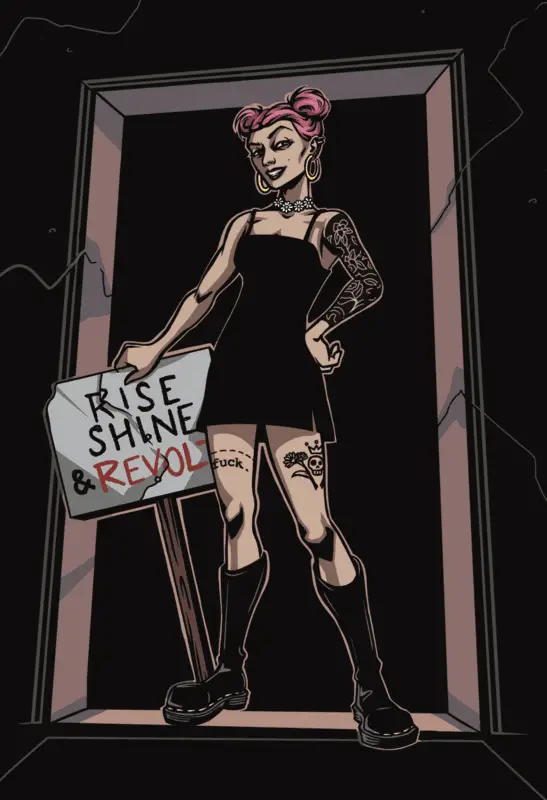
How do you balance the vital safety and comfort of players with the game’s often discomforting horror themes? Or, alternatively, do you think there’s anything uncomfortable at work here?
Zach Cox: Mad as Hell is a game about confronting difficult topics, but its always important to make sure everyone is safe while doing so. The themes of the game are linked to violence against the marginalised, the horrors of capitalism and abusive power structures.
All our games strictly encourage the use of safety tools and we make sure to give advice on using them in Mad as Hell. We worked with several sensitivity readers on the game from various political movements in different parts of the world. All the demons are clearly labelled with content warnings relating to the violence that manifests them and also the creatures themselves.
An important part of this being a teaching tool is that the game has to be safe and approachable, and if we disregard player safety that would be negligent.
What emotions were you feeling working through the design of this game? Was it cathartic at all to be working on an artifact of resistance? Is there hope to be had in this?
Zach Cox: I talked last year on a Rascal article about how sad most of SoulMuppet’s catalogue is, and how I wanted to make a game about something else in 2025 and this is it.
Evie and I envisaged this as a game about rage. Rage against the system and those complicit in it. It’s called Mad as Hell for a reason. SoulMuppet (and by extension my) games are about struggling against great forces with impossible odds and this throws a new spin on it. The world is filled with people who feel great and inescapable rage against capitalism and the long, slow slide of the world into chaos, and a matching sense of helplessness.
This is a game about wanting to affect change in the world, learning how to make that change happen and going out and doing it. Go out, get Mad as Hell! Go to a protest, write a letter to your MP, do some activism!
You’ve worked with two great artists, Per Norden and Scrap Princess, as well as cover artist Alex Eckman-Lawn, to create the visual style of this game. Where did your discussions start when planning the art direction and how did you land on the final product?
Zach Cox: We started with Per as the natural choice for our internal politics. Evie knew Per from a couple of Discord servers and liked their art and reached out together. They’ve done the bulk of the illustration for the book in a mix of different styles. The player half of the book is the Radical’s art, and includes comic book styles with bold colors and shapes, repeated friendly faces and lots of protest signs and graffiti. Meanwhile, the GM half of the book is enemy territory and represents the hostile forces of Reaction, which is much smoother and greyer, sterile, brutalist and incredibly dehumanized, not featuring any human faces and inspired a lot by the smoothness of modern corporate aesthetics.
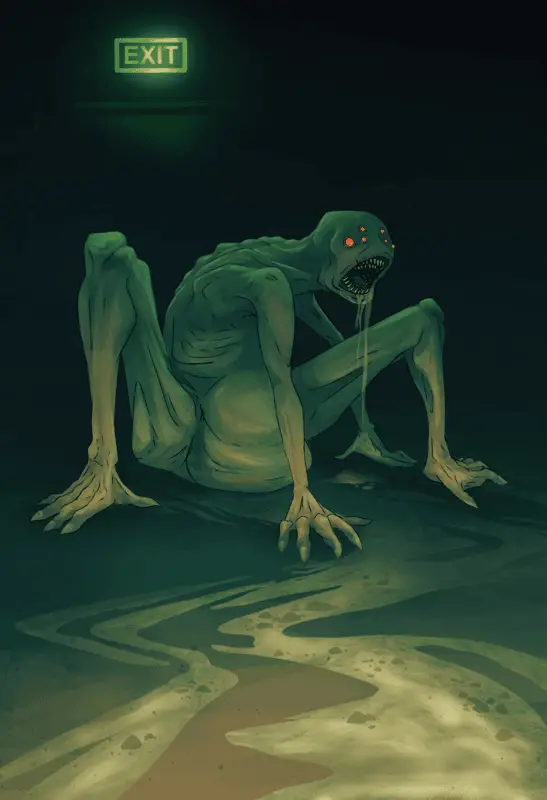
Once we decided to make this thing called the Radical’s Handbook, a player facing lore/setting zine to teach players how to play the game, the next step was finding an artist who could do something in the scrappy, homemade style of an in-world zine. Scrap was the natural choice. I’ve loved Scrap’s work on stuff like Deep Carbon Observatory and Fire on the Velvet Horizon for years, and always wanted to work with him. Their stuff is this absurd, frenzied, freehand chaotic style with almost-surrealist monsters drawing that looks childish when you first see it, but the more you look at it the more obviously technical it is.
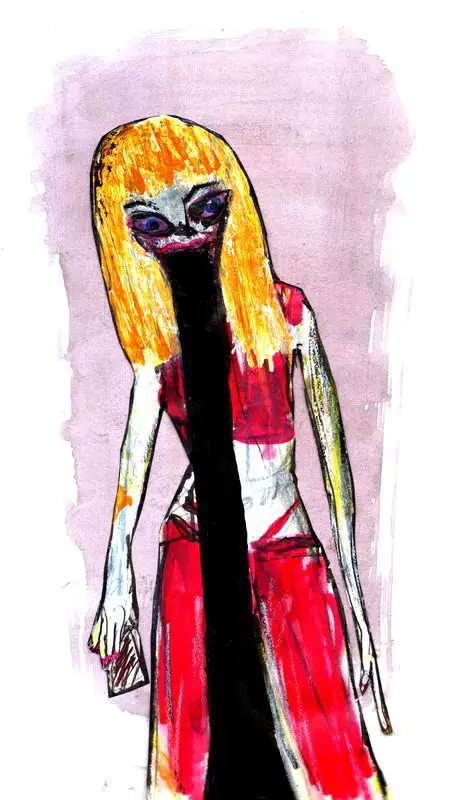
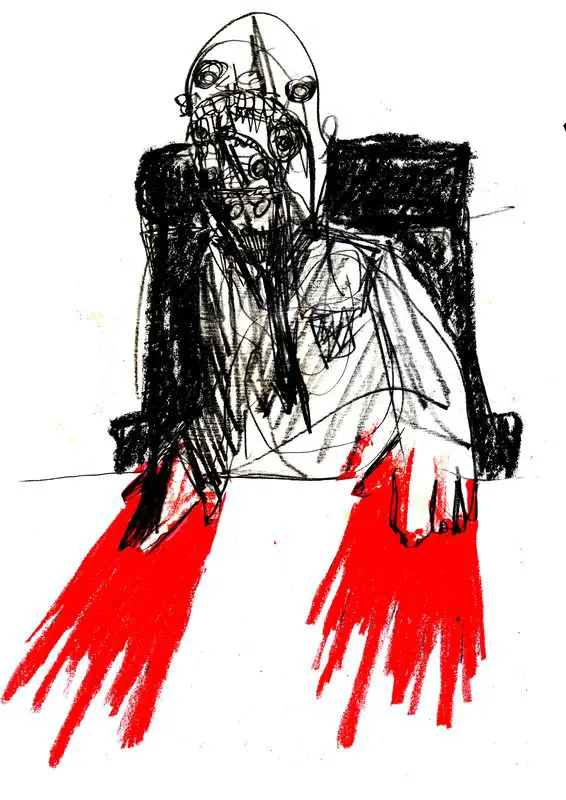
All of this has fed into Dai Shugar’s layout, which meshes into the different art styles with a cohesive energy but sympathetic to the needs of the individual artists and the aesthetics they are trying to create. Dai is a pro, having done work for us on Throne of Avarice, Inevitable and Orbital Blues: Afterburn, and his stuff for Mad as Hell is his best work for SoulMuppet yet.
Alex was a bit of a yeet and I’m so happy he agreed to work with us. We wanted to make something for the cover that represented the concept of a Wound in the World, a portal to ‘hell’. Alex does these amazing three-dimensional collage pieces and we commissioned him to make a double-die cut book with a die-cut dust jacket and a die-cut hardcover, so you can see all the way to the endpapers. The final result is going to be awe inspiring.
You’ve gotten quite a…passionate response from some corners of the TTRPG space on the subject and focus of the title. Do you have anything you’d like to say on the political nature of TTRPG’s and the vital part that politics plays in the artistic process?
Zach Cox: There has certainly been a negative response from right winger and conservatives. Lots of people have told us its hypocritical to make and sell an anti-capitalist RPG using Kickstarter or to use Facebook Ads. What do you want me to say? We live in a society. Someone find the meme. Well done. You are very intelligent.
Games are art. Art is political. End of story. Anything more than a drawing of a pot of plants has politics in it. The moment you include a female body or a person with an opinion in a roleplaying game, that’s political. Making a game that tries not to have politics in it is a political statement, since the absence of politics is. If space has a ‘no politics’ rule, then that is whoever is running it attempting to sand the edges of opinion of their space and allow radicals to participate in the space and make it unsafe for marginalised people. It’s the same for games. No politics is a decision about politics, so I make games about politics.
It’s not a part of the process, it is the process. If we made this game and there wasn’t a verbal, vitriolic response from Reactionaries then we wouldn’t have been doing our jobs properly
You can back Mad As Hell on Kickstarter, with the campaign set to run through June 1, 2025. You can check out more of Zach and SoulMuppet’s work at their website as well as their itch.io page.
Images via SoulMuppet Publishing
Have strong thoughts about this piece you need to share? Or maybe there’s something else on your mind you’re wanting to talk about with fellow Fandomentals? Head on over to our Community server to join in the conversation!

